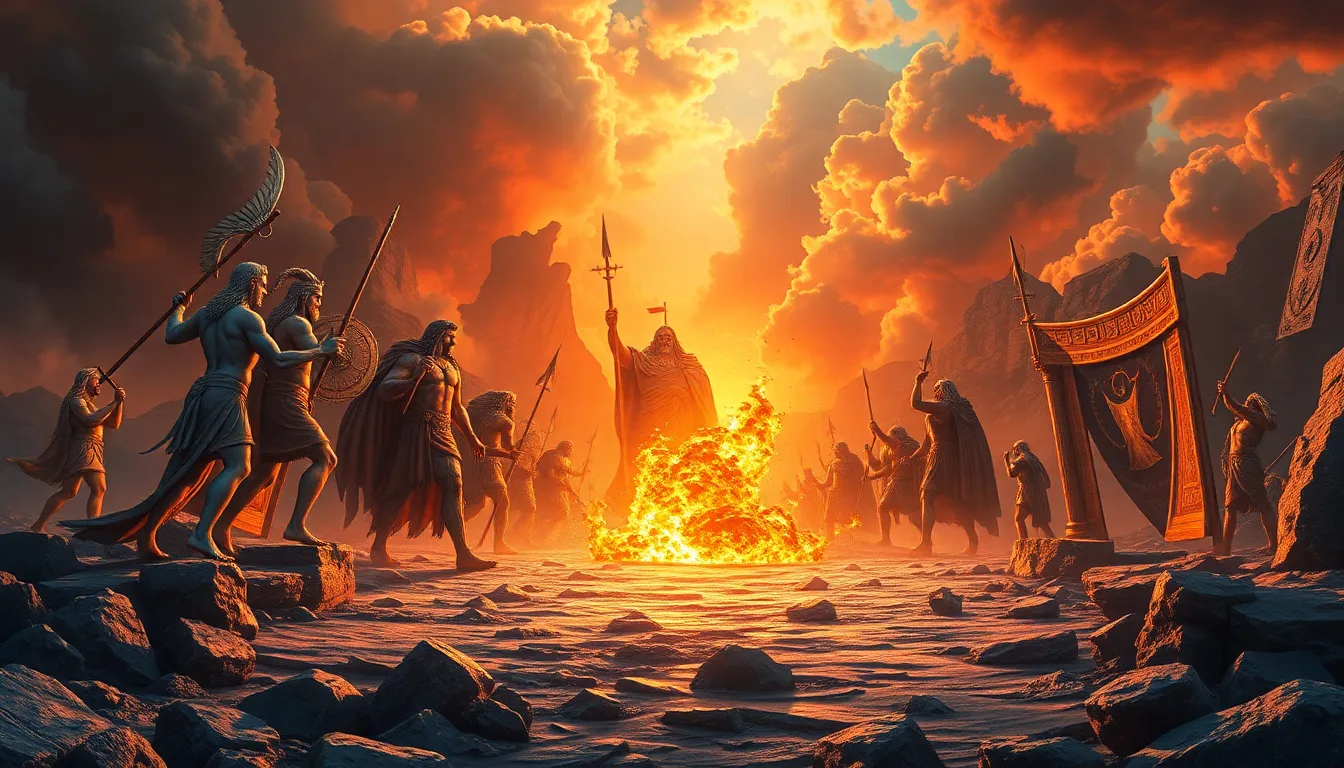The Titanomachy: A Legendary War Between Gods and Giants
I. Introduction to the Titanomachy
The Titanomachy, a significant event in Greek mythology, refers to the epic war fought between the Titans and the Olympians. This monumental conflict symbolizes the struggle for power and control over the cosmos, casting long shadows over subsequent myths and stories.
In this battle, the Titans, who were the original deities of Greek mythology, faced off against their offspring, the Olympian gods, led by Zeus. The Titanomachy is not just a tale of might; it encapsulates themes of ambition, fear, and the cyclical nature of power.
Key players include:
- The Titans: Powerful elder gods, descendants of Gaia and Uranus.
- The Olympians: The younger generation of gods, including Zeus, Hera, Poseidon, and others.
- The Giants: Creatures born from the blood of Uranus, often allied with the Titans.
II. Origins of the Titans and Olympians
The narrative of the Titanomachy begins with the creation of the cosmos. According to Greek mythology, the universe emerged from Chaos, leading to the formation of Gaia (Earth) and Uranus (Sky). Their union produced the Titans, a race of powerful beings who would rule before the Olympians.
Among the most notable Titans were Cronus and Rhea. Cronus, the youngest of the Titans, seized power from his father Uranus, driven by a desire to prevent a prophecy that foretold he would be overthrown by his own child. Rhea, his sister and wife, bore him several children, including the future Olympians: Zeus, Hera, Poseidon, Hestia, Demeter, and Hades.
Thus, the stage was set for the inevitable clash between the Titans and the Olympians, as the latter sought to claim their rightful place in the heavens.
III. The Causes of the Titanomachy
The Titanomachy was not an arbitrary conflict; it arose from a multitude of factors:
- Fear of Overthrow: Cronus’s paranoia about losing his power led him to swallow his children at birth, fearing they would rise against him.
- Prophecies: A prophecy foretold that one of Cronus’s children would overthrow him, leading to his ruthless actions against his offspring.
- Gaia’s Role: Gaia, angered by the treatment of her children, the Titans, sought revenge against Cronus. She played a pivotal role in instigating the war by supporting the rise of Zeus.
IV. Key Events Leading up to the War
As tensions escalated, several key events paved the way for the Titanomachy:
- Zeus’ Rebellion: After being saved by Rhea, Zeus grew up in secrecy. He eventually rallied his siblings and allies, including the Cyclopes and Hecatoncheires, to challenge Cronus.
- Imprisonment of the Cyclopes: The Cyclopes, skilled craftsmen and creators of thunderbolts, had been imprisoned by Cronus. Zeus freed them, gaining powerful weapons for the impending war.
- Strategic Alliances: Zeus forged alliances with various entities, including the Titans who opposed Cronus, and the Hecatoncheires, monstrous beings with a hundred hands, enhancing the Olympians’ military strength.
V. The Battles of the Titanomachy
The Titanomachy was marked by several fierce confrontations:
- Major Battles: The battles raged for ten years, with both sides showcasing their might. The Olympians employed strategic maneuvers, while the Titans used brute force.
- Role of Deities and Creatures: Various gods and mythical creatures participated, including Athena, who provided wisdom, and Hermes, who acted as a messenger. The monstrous Hecatoncheires unleashed havoc upon the Titans.
- Mount Olympus as the Battlefield: The war’s primary battleground was on and around Mount Olympus, symbolizing the high stakes of divine power and authority.
VI. The Outcome of the Titanomachy
The conclusion of the Titanomachy marked a significant shift in the divine hierarchy:
- Defeat of the Titans: After a prolonged struggle, the Olympians emerged victorious. Cronus and the other Titans were defeated, leading to their imprisonment in Tartarus, a deep abyss used as a dungeon of torment.
- Establishment of Olympian Rule: With the Titans vanquished, Zeus and his siblings ascended to power, establishing the reign of the Olympian gods, which would shape Greek mythology profoundly.
- Impact on Natural Order: The defeat of the Titans restored balance to the cosmos, establishing the Olympians as rulers of the world and influencing human affairs through their divine will.
VII. Legacy and Cultural Impact of the Titanomachy
The Titanomachy left an indelible mark on Greek culture and beyond:
- Representation in Art and Literature: The Titanomachy has inspired countless works of art, from ancient pottery to Renaissance paintings. Poets like Hesiod captured the drama of the war in texts such as “Theogony.”
- Influence on Later Mythologies: The themes of the Titanomachy resonate through various cultures, where tales of divine conflict and the rise of new gods are prevalent.
- Modern Interpretations: Contemporary adaptations in literature, film, and video games continue to explore the Titanomachy, reflecting its timeless themes of power struggles and destiny.
VIII. Conclusion
In summary, the Titanomachy stands as a crucial chapter in Greek mythology, representing the conflict between old and new, fear and ambition. It reflects the enduring themes of power, rebellion, and the inevitable nature of change.
The Titanomachy serves as a reminder of the complexities of divine relationships and the forces that shape the world. Its legacy continues to inspire artists, writers, and thinkers, ensuring that its stories remain relevant in contemporary culture.




